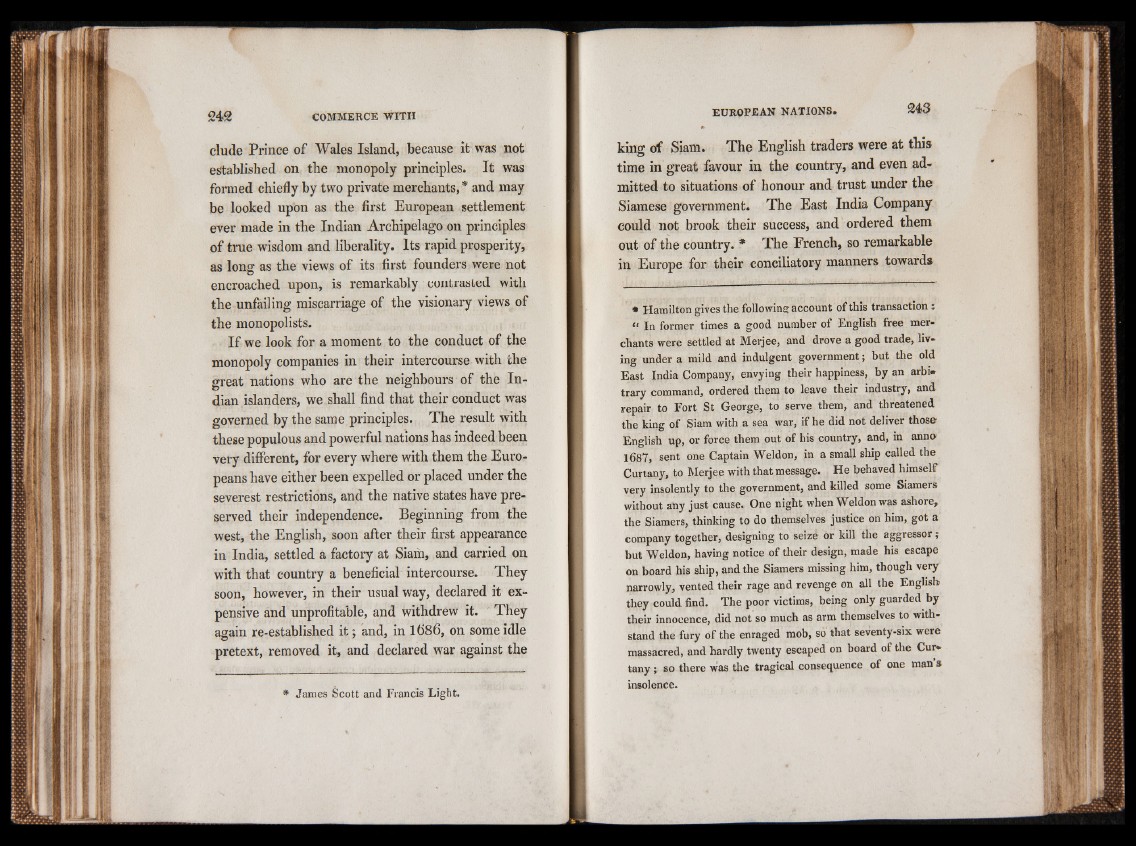
elude Prince of Wales Island, because it was not
established on the monopoly principles. It was
formed chiefly by two private merchants, * and may
be looked upon as the first European settlement
ever made in the Indian Archipelago on principles
of true wisdom and liberality. Its rapid prosperity,
as long as the views of its first founders were not
encroached upon, is remarkably contrasted with
the unfailing miscarriage of the visionary views of
the monopolists.
If we look for a moment to the conduct of the
monopoly companies in their intercourse with the
great nations who are the neighbours of the Indian
islanders, we shall find that their conduct was
governed by the same principles. The result with
these populous and powerful nations has indeed been
very different, for every where with them the Europeans
have either been expelled or placed under the
severest restrictions, and the native states have preserved
their independence. Beginning from the
west, the English, soon after their first appearance
in India, settled a factory at Siam, and carried on
with that country a beneficial intercourse. They
soon, however, in their usual way, declared it expensive
and unprofitable, and withdrew it. They
again re-established it ; and, in 1686, on some idle
pretext, removed it, and declared war against the
* James Scott and Francis Light.
king of Siam. The English traders were at this
time in great favour in the country, and even admitted
to situations of honour and trust under the
Siamese government. The East India Company
could not brook their success, and ordered them
out of the country. * The French, so remarkable
in Europe for their conciliatory manners towards
* Hamilton gives the following account of this transaction :
“ In former times a good number of English free merchants
were settled at Merjee, and drove a good trade, living
under a mild and indulgent government ; but the old
East India Company, envying their happiness, by an arbitrary
command, ordered them to leave their industry, and
repair to Fort St George, to serve them, and threatened
the king of Siam with a sea war, if he did not deliver those
English up, or force them out of his country, and, in anno
1687, sent one Captain Weldon, in a small ship called the
Curtany, to Merjee with that message. He behaved himself
very insolently to the government, and killed some Siamers
without any just cause. One night when Weldon was ashore,
the Siamers, thinking to do themselves justice on him, got a
company together, designing to seize or kill the aggressor ;
but Weldon, having notice of their design, made his escape
on board his ship, and the Siamers missing him, though very
narrowly, vented their rage and revenge on all the English
they could find. The poor victims, being only guarded by
their innocence, did not so much as arm themselves to withstand
the fury of the enraged mob, so that seventy-six were
massacred, and hardly twenty escaped on board of the Curtany
; so there was the tragical consequence of one man a
insolence.